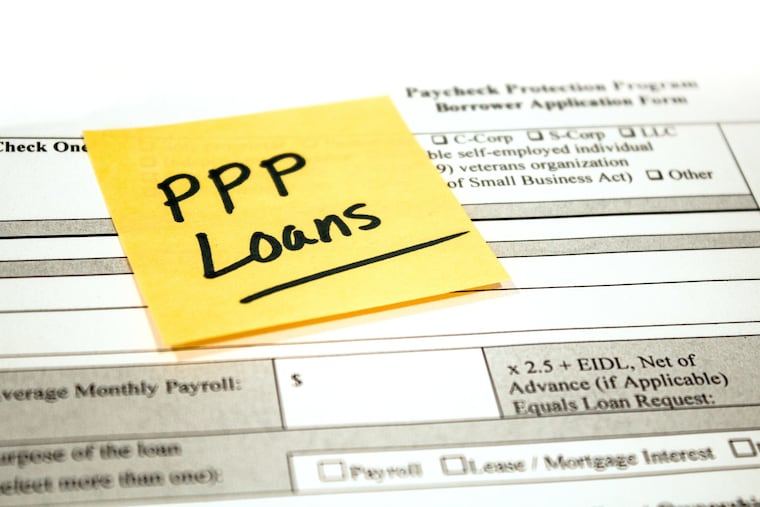Small businesses still face $28 billion of unforgiven PPP Loans
Many small business owners are struggling with the process of seeking forgiveness.

Almost 350,000 loans made to small businesses in 2020 during the COVID-19 pandemic haven’t been forgiven, according to a Bloomberg News analysis of Paycheck Protection Program data, and most of them are for less than $25,000.
That lingering debt - about $28 billion, the analysis shows - is creating a burden for the smallest businesses, including many run by minority entrepreneurs, say advocacy groups, community leaders and business owners. Many are struggling with the process of seeking forgiveness under terms of the loan program that distributed more than $800 billion over two years.
Angela Thompson, owner and chief executive officer of a property renovation company based in Jacksonville, Florida, first applied for forgiveness for her $172,000 PPP loan in December 2020. Over a year and more than 100 calls to loan providers later, she's gotten several notices saying she's on the hook to start repaying the debt.
Initially, she applied for forgiveness via Kabbage, the online lender that had given her the loan. But when American Express Co. bought Kabbage in August 2020, it didn’t acquire its pre-existing loan portfolio.
Instead, her loan lived with another provider, K Servicing. Thompson did not get a link to their PPP forgiveness website until August 2021. She immediately submitted her application. But in December, she got a bill for $22,000 for her monthly loan re-payment; and then another in January and another in February.
K Servicing customer service told her to ignore the notices, but the Small Business Administration, the federal agency that administers the program, still listed her loan as unforgiven in its most recent data update on Jan. 3. "I have great credit. How are you telling me to ignore a bill?" Thompson said in an interview. "This has me stressed out."
K Servicing told Bloomberg News that the majority of its PPP loans have been forgiven and that it's continuing to work with customers who have outstanding loans.
Advocates led by the Center for Responsible Lending, on Thursday asked the SBA, the U.S. Treasury and Congress to take steps to help small business owners with outstanding PPP loans, including by automatically forgiving those of $25,000 and less.
National Urban League, National Association for Latino Community Asset Builders, and National Coalition for Asian Pacific American Community Development are among the more than 50 advocacy groups, minority-business associations and minority-focused lenders that signed the letter.
They say the smallest business owners, some of them sole proprietors, including drivers, cleaners and landscapers, have more challenges documenting payroll, expenses and income. This is especially true if businesses are cash based, lack professional accountants or face technology and language barriers.
"We must come through for the most vulnerable," said Aracely Panameño, former director of Latino affairs at the Center for Responsible Lending.
Advocates are also asking the SBA to rescind a rule denying forgiveness to borrowers who made good-faith errors and eliminate 'gotcha' denials of loan forgiveness due to sudden rule changes.
"Borrowers are desperate. Small businesses thought they were doing everything right. Now they are being told their loans are not forgiven," said Tracy Ward, a director at Self-Help Ventures Fund, a nonprofit lender based in North Carolina.
One small-business owner said Bank of America Corp. denied forgiveness for a $15,000 loan because she lacked a specific payroll document. She spent nine months pleading her case to the bank and local elected officials to no avail. Her first repayment bill for $2,000 came in October.
"PPP applicants were responsible for determining their own eligibility under the complex program rules," the letter from advocacy groups reads. "While eligibility for SBA loan programs is typically determined by the lender and SBA, for PPP this burden was shifted to the small business borrower."
The SBA declined to comment on future policy decisions. The agency last month announced that borrowers could request an SBA review of partially forgiven PPP loans.
While the vast majority of the 5.14 million PPP loans approved in 2020 have been forgiven - and many borrowers had a smooth process - as of early January, there were 349,372 unforgiven loans and another 380,000 that were partially forgiven.
The SBA has approved more than 11.4 million PPP loans since 2020; the forgiveness process is still underway for some of those issued last year.
Many of the issues plaguing business owners seeking forgiveness also made it hard for them to get loans in the earliest phase of the program. In the first tranche of PPP loans, lenders distributed an outsize number to White neighborhoods. Minority-owned businesses tend to be smaller and small businesses more often lack existing relationships to mainstream banks and accountants to help with paperwork. And most don't have formal employees.
Even for those who get approval, getting forgiveness can be difficult, said Dennis Huang, executive director of the Asian Business Association. The Los Angeles-based nonprofit got a PPP loan for about $38,000 in February 2021.
Huang, who has an MBA, said it was difficult to find basic information about forgiveness from his lenders Northeast Bank and ACAP Fund, now called Newity. Application forms were buried deep within websites, deadlines were unclear and customer service was shoddy. "ACAP had a phone tree that goes in circles. I could not get a live person to help us," said Huang. Finally in November 2021, the SBA listed the loan as forgiven.
The process was “horrible,” said Huang. “I don’t know how small businesses do it.”